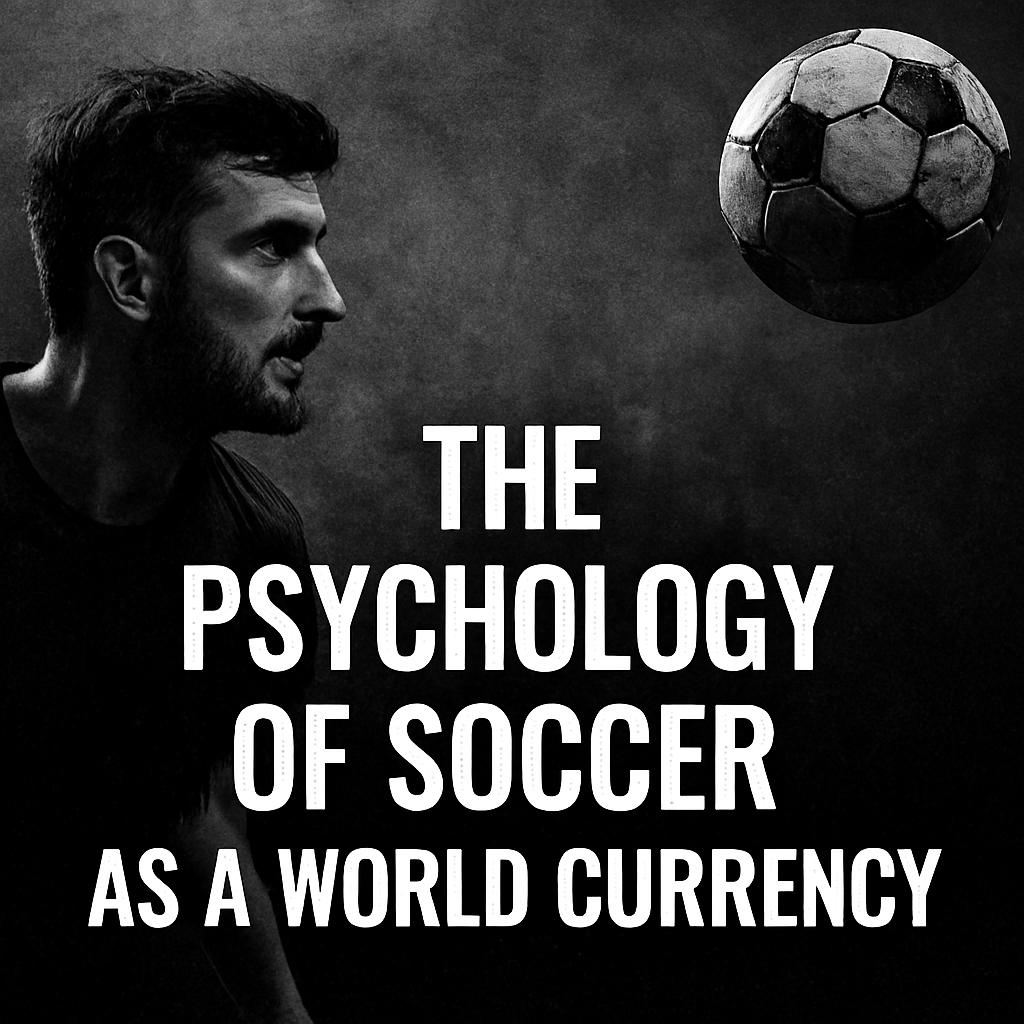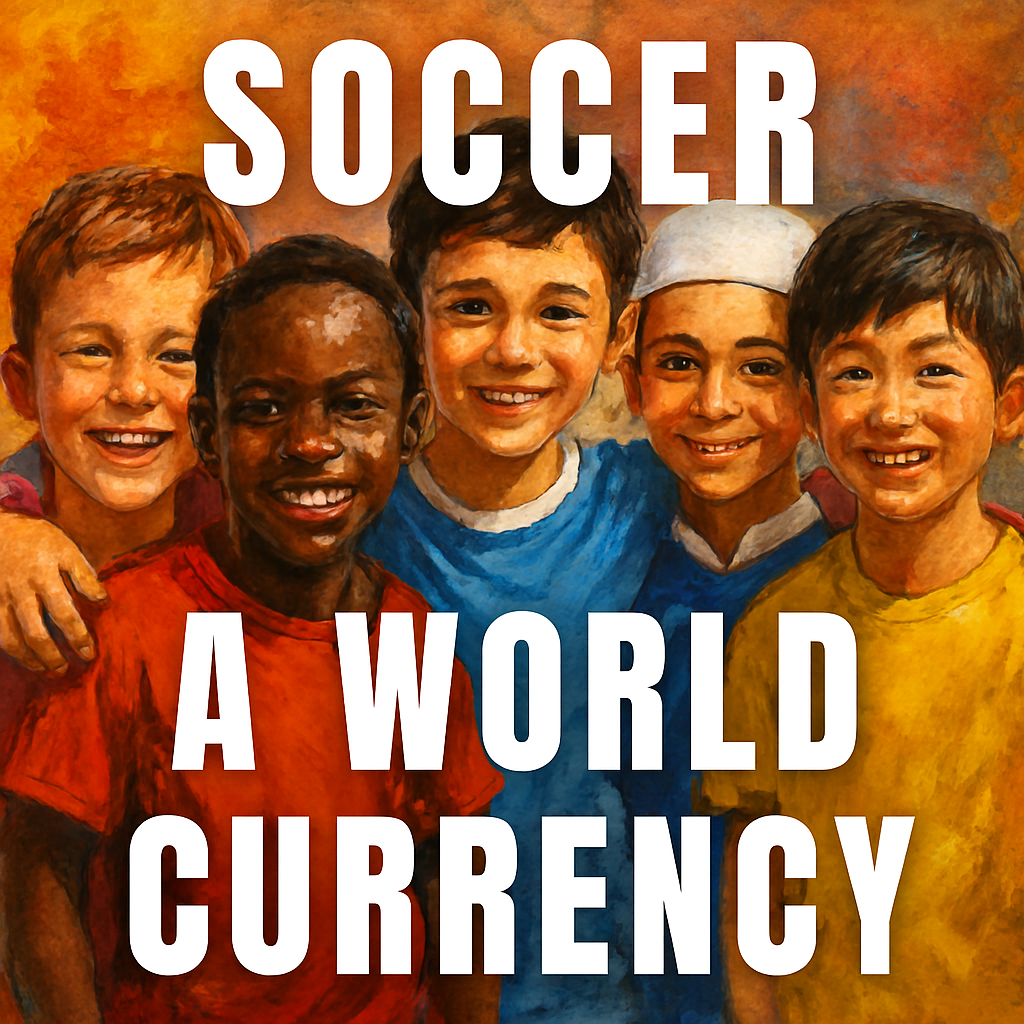Complex Football AKA Soccer Psychology As A World Currency
Soccer Psychology As A World Currency – Understanding The Global Power Of Football
Soccer, also known as football, is more than a sport. It is a cultural phenomenon that influences psychology, economics, and identity across nations. The game has become a symbolic currency, shaping values, financial flows, and collective emotions. Its reach extends from grassroots communities to billion-dollar stadiums, creating a shared language that transcends borders. The psychology of soccer reveals how passion can be monetized, how loyalty becomes investment, and how competition drives innovation. By examining soccer as a world currency, we uncover the hidden structures that connect psychology with finance. Its influence stretches into politics, commerce, and education. Understanding this duality allows us to see soccer as both a psychological anchor and a financial engine.

Emotional Identity – The Psychological Value Of Team Allegiance
Fans develop deep emotional bonds with their teams, treating victories as personal triumphs and losses as personal defeats. This identity is reinforced through rituals, chants, and symbols that create belonging. The psychology of allegiance mirrors financial investment, where loyalty is treated as capital. Clubs leverage this identity to build brand equity, turning passion into measurable value. Emotional identity also drives merchandise sales, ticket demand, and digital engagement. The sense of belonging becomes a currency exchanged between fans and institutions. This psychological capital is transferable across generations, sustaining long-term financial growth. Emotional loyalty explains why clubs can survive poor performance yet thrive economically.
| Psychological Factor | Financial Impact | Example |
|---|---|---|
| Team Loyalty | Merchandise Sales | Jerseys, scarves |
| Rituals And Chants | Ticket Demand | Matchday atmosphere |
| Generational Bonds | Sustained Revenue | Family season passes |
| Emotional Capital | Brand Equity | Club valuation |
| Identity Transfer | Digital Engagement | Social media growth |
Collective Memory – How History Shapes Financial Futures
The collective memory of soccer creates narratives that influence both psychology and economics. Historic victories and legendary players become cultural assets, shaping the value of clubs and nations. These memories are monetized through documentaries, museum exhibitions, and anniversary events. Fans psychologically invest in nostalgia, treating history as a form of currency. Clubs use this memory to justify higher ticket prices and premium memberships. Collective memory also drives tourism, as fans travel to iconic stadiums and monuments. The financial future of soccer is built on the preservation of its past. This duality of memory and money demonstrates how psychology sustains economic growth. The currency of soccer is not only present performance but also historical resonance.
- Historic victories create cultural assets
- Legendary players increase brand value
- Nostalgia drives merchandise demand
- Documentaries monetize collective memory
- Stadiums become tourism destinations
- Anniversary events generate premium sales
- Fans psychologically invest in history
- Clubs justify higher ticket prices
- Memory sustains economic growth
- History becomes a financial currency
Global Broadcasting – The Psychological Pull Of Shared Spectacle
Broadcasting transforms soccer into a shared psychological spectacle. Fans across continents experience the same emotions simultaneously, creating a sense of unity. This shared experience is monetized through broadcasting rights, advertisements, and streaming platforms. The psychology of spectacle explains why fans pay for access to live matches. Broadcasting rights have become one of the largest financial currencies in soccer. The emotional pull of shared spectacle drives global demand, making soccer the most watched sport. Clubs and leagues capitalize on this demand by negotiating billion-dollar contracts. The psychology of broadcasting demonstrates how emotional resonance translates into financial power. Shared spectacle is both a psychological anchor and an economic driver.
| Broadcasting Element | Psychological Effect | Financial Outcome |
|---|---|---|
| Live Matches | Shared Emotions | Subscription fees |
| Global Access | Unity Across Borders | International contracts |
| Streaming Platforms | Instant Gratification | Digital revenue |
| Advertisements | Emotional Association | Sponsorship deals |
| Commentary | Narrative Reinforcement | Media partnerships |
Sponsorship Psychology – The Currency Of Association
Sponsorship in soccer is built on psychological association. Brands align themselves with clubs to borrow emotional capital from fans. This association creates trust, loyalty, and recognition that extends beyond the pitch. Sponsorship psychology explains why companies pay millions to place logos on jerseys. Fans subconsciously transfer their loyalty from clubs to brands. This transfer becomes a financial currency, sustaining long-term partnerships. Sponsorship also influences consumer behavior, driving sales and brand awareness. The psychology of association demonstrates how soccer’s emotional power is monetized. Sponsorship is not only financial but also psychological investment.
- Brands align with clubs for emotional capital
- Logos on jerseys create subconscious loyalty
- Sponsorship drives consumer behavior
- Fans transfer allegiance to brands
- Companies pay millions for association
- Sponsorship sustains long-term partnerships
- Emotional power is monetized through branding
- Sponsorship psychology explains consumer trust
- Association becomes financial currency
- Sponsorship is both financial and psychological investment
Stadium Atmosphere – The Psychological Economics Of Space
Stadiums are more than physical structures; they are psychological theaters. Fans associate stadiums with identity, belonging, and ritual. The atmosphere created within these spaces drives ticket demand and premium seating sales. Stadium psychology explains why fans pay more for immersive experiences. Clubs monetize atmosphere through hospitality packages, naming rights, and exclusive zones. The economics of space demonstrate how psychology shapes soccers financial flows. Stadiums also become cultural landmarks, attracting tourism and investment. The psychological economics of stadiums extend beyond matchday revenue. Atmosphere is a currency exchanged between fans and institutions. Stadium psychology reveals the balance between emotional resonance and financial impact.
| Stadium Factor | Psychological Effect | Financial Impact |
|---|---|---|
| Atmosphere | Immersion | Ticket demand |
| Identity | Belonging | Season passes |
| Rituals | Tradition | Hospitality packages |
| Naming Rights | Recognition | Corporate investment |
| Tourism | Cultural Landmark | Economic growth |
Player Psychology – The Currency Of Performance
Players embody psychological and financial currency simultaneously. Their performance influences fan emotions, club valuation, and sponsorship deals. Player psychology explains how confidence, resilience, and motivation translate into financial outcomes. Clubs invest in psychological training to maximize performance. A player’s mental state can determine match results and economic success. Fans psychologically invest in players, treating them as symbols of identity. This investment drives merchandise sales and digital engagement. Player psychology demonstrates the link between mental health and financial growth. Performance is both a psychological anchor and a financial currency. The psychology of players is central to soccer’s global economy.
- Performance influences fan emotions
- Confidence drives match results
- Resilience sustains long-term success
- Motivation translates into financial outcomes
- Clubs invest in psychological training
- Mental state determines economic success
- Fans invest in player identity
- Merchandise sales reflect psychological bonds
- Digital engagement monetizes player loyalty
- Player psychology links mental health and finance
Fan Rituals – The Psychological Investment In Tradition
Soccer rituals are deeply embedded in the psychology of fans, shaping identity and reinforcing loyalty. These traditions include chants, songs, and symbolic gestures that create a sense of belonging. Rituals are passed down through generations, becoming cultural assets that sustain emotional investment. The psychology of ritual explains why fans feel compelled to participate, even when results are uncertain. Clubs monetize these traditions by embedding them into merchandise, stadium experiences, and digital campaigns. Rituals become a form of currency exchanged between fans and institutions. The emotional weight of tradition sustains long-term financial growth. Rituals also create predictability, offering psychological comfort in uncertain times. The psychology of ritual demonstrates how tradition becomes both emotional and financial capital.
| Ritual Element | Psychological Effect | Financial Outcome |
|---|---|---|
| Chants | Belonging | Ticket demand |
| Songs | Identity | Merchandise sales |
| Gestures | Unity | Digital engagement |
| Generational Transfer | Continuity | Sustained revenue |
| Predictability | Comfort | Long-term loyalty |
Youth Development – The Currency Of Future Potential
Youth academies represent both psychological hope and financial investment. Fans psychologically invest in young players, seeing them as symbols of continuity. Clubs monetize this hope by selling academy graduates or integrating them into first teams. Youth development is a truly a powerful and long term currency of future potential, balancing psychology with finance. The psychology of hope sustains fan engagement during rebuilding phases. Financially, youth academies reduce transfer costs and generate profit through player sales. Fans emotionally connect with homegrown talent, treating them as cultural icons. Youth development demonstrates how psychology and finance intersect in long-term planning. The currency of potential is central to soccer’s sustainability. The psychology of youth explains why fans and clubs invest in tomorrow’s stars.
- Youth academies symbolize continuity
- Fans invest emotionally in young players
- Clubs monetize hope through player sales
- Homegrown talent reduces transfer costs
- Youth development sustains engagement during rebuilding
- Potential becomes financial currency
- Fans treat academy graduates as cultural icons
- Long-term planning balances psychology and finance
- Youth development ensures sustainability
- Tomorrow’s stars embody psychological hope
National Identity – The Currency Of Collective Pride
National teams embody collective pride, shaping psychological identity across borders. Fans see victories as national triumphs, reinforcing unity and belonging. The psychology of socer and sports country pride explains why international tournaments attract massive audiences. National identity becomes a currency exchanged between citizens and institutions. Governments invest in soccer to strengthen cultural cohesion and global recognition. Financially, international tournaments generate tourism, broadcasting revenue, and sponsorship deals. Fans psychologically invest in national teams, treating them as symbols of collective strength. National identity demonstrates how soccer transcends sport to become cultural currency. The psychology of pride sustains both emotional and financial growth. Soccer as national identity is a powerful psychological and financial engine.
| National Element | Psychological Effect | Financial Impact |
|---|---|---|
| Victories | Collective Pride | Tourism revenue |
| Tournaments | Unity | Broadcasting contracts |
| National Symbols | Belonging | Sponsorship deals |
| Government Investment | Cohesion | Infrastructure growth |
| Collective Strength | Identity | Economic expansion |

Digital Engagement – The Currency Of Online Connection
Digital platforms transform soccer into a psychological and financial currency of connection. Fans engage through social media, streaming, and interactive apps. The psychology of connection explains why fans seek constant updates and interaction. Clubs monetize digital engagement through advertisements, subscriptions, and e-commerce. Digital platforms create emotional bonds that extend beyond matchdays. Fans psychologically invest in online communities, treating them as extensions of identity. Financially, digital engagement generates new revenue streams and global reach. The currency of connection sustains soccer’s influence in the digital age. Digital psychology demonstrates how emotional resonance translates into financial growth. Online connection is both psychological anchor and financial currency.
- Social media sustains emotional bonds
- Streaming platforms monetize constant updates
- Interactive apps create identity extensions
- Digital engagement generates advertisements
- Online communities reinforce belonging
- Clubs monetize e-commerce through digital platforms
- Digital psychology sustains global reach
- Emotional resonance drives financial growth
- Online connection is psychological currency
- Digital engagement anchors soccer in the modern age
Transfer Market – The Psychology Of Valuation
The transfer market represents both psychological excitement and financial valuation. Fans psychologically invest in transfers, treating them as symbols of ambition. Clubs monetize this excitement through ticket sales, merchandise, and digital engagement. The psychology of valuation explains why fans equate spending with success. Transfers become a currency exchanged between clubs, agents, and fans. Financially, the transfer market drives billions in global transactions. Fans emotionally connect with new signings, treating them as cultural icons. The psychology of transfers sustains engagement during off-seasons. Valuation demonstrates how psychology and finance intersect in player movement. The transfer market is both psychological spectacle and financial engine.
| Transfer Element | Psychological Effect | Financial Outcome |
|---|---|---|
| New Signings | Excitement | Merchandise sales |
| Spending | Ambition | Ticket demand |
| Player Movement | Identity | Digital engagement |
| Global Transactions | Spectacle | Financial growth |
| Off-Season | Sustained Engagement | Media coverage |
Economic Inequality – The Currency Of Disparity
Soccer reflects economic inequality, shaping psychological perceptions of fairness. Fans psychologically invest in narratives of underdogs and giants. Clubs monetize disparity by marketing rivalries and dramatic storylines. The psychology of inequality explains why fans are drawn to contrasts. Financially, disparity sustains competitive balance and media interest. Underdogs generate emotional investment, while giants attract global sponsorship. The currency of disparity demonstrates how inequality becomes both psychological and financial capital. Fans emotionally connect with stories of struggle and triumph. Economic inequality sustains soccer’s narrative power. The psychology of disparity reveals how contrasts drive both emotional and financial growth.
- Inequality shapes perceptions of fairness
- Fans invest in underdog narratives
- Giants attract global sponsorship
- Rivalries monetize disparity
- Contrasts sustain competitive balance
- Media interest thrives on inequality
- Emotional investment drives engagement
- Disparity becomes financial capital
- Struggle and triumph create narrative power
- Inequality sustains soccer’s growth
Global Migration – The Currency Of Cultural Exchange
Player migration reflects both psychological adaptation and financial exchange. Fans psychologically invest in multicultural teams, treating them as symbols of diversity. Clubs monetize migration through global marketing and sponsorship. The psychology of exchange explains why fans embrace international players. Migration becomes a currency exchanged between cultures and institutions. Financially, migration sustains global transfer markets and broadcasting contracts. Fans emotionally connect with multicultural representation, reinforcing inclusivity. Migration demonstrates how psychology and finance intersect in cultural exchange. The changing currency of diversity sustains soccer’s global change and identity. Migration psychology reveals how cultural exchange drives both emotional and financial growth.
| Migration Element | Psychological Effect | Financial Impact |
|---|---|---|
| Multicultural Teams | Diversity | Global marketing |
| International Players | Inclusivity | Sponsorship deals |
| Cultural Exchange | Adaptation | Broadcasting contracts |
| Global Transfers | Identity | Financial growth |
| Representation | Emotional Connection | Sustained engagement |

Psychological Resilience – The Currency Of Recovery
Resilience in soccer reflects both psychological strength and financial sustainability. Fans psychologically invest in narratives of recovery after defeat. Clubs monetize resilience through documentaries, merchandise, and motivational campaigns. The psychology of recovery explains why fans admire perseverance. Resilience becomes a currency exchanged between players, clubs, and fans. Financially, resilience sustains long-term engagement and brand equity. Fans emotionally connect with stories of comeback and redemption. Resilience demonstrates how psychology and finance intersect in recovery. The currency of strength sustains soccer’s narrative power. Resilience psychology reveals how recovery drives both emotional and financial growth.
- Recovery reflects psychological strength
- Fans invest in comeback narratives
- Clubs monetize resilience through campaigns
- Perseverance sustains engagement
- Resilience becomes financial currency
- Documentaries reinforce emotional bonds
- Merchandise celebrates recovery stories
- Brand equity grows through resilience
- Redemption sustains narrative power
- Resilience drives financial growth
Media Narratives – The Currency Of Storytelling
Media narratives shape the psychological and financial currency of soccer. Fans psychologically invest in stories of triumph, rivalry, and redemption. Clubs monetize these narratives through documentaries, interviews, and branded campaigns. The psychology of storytelling explains why fans consume content beyond the pitch. Media narratives become a currency exchanged between journalists, clubs, and audiences. Financially, storytelling sustains advertising revenue and subscription demand. Fans emotionally connect with narratives that reinforce identity and belonging. Media psychology demonstrates how emotional resonance translates into financial growth. Storytelling sustains soccer’s influence across generations. The currency of narrative reveals how psychology and finance intersect in communication.
| Narrative Element | Psychological Effect | Financial Outcome |
|---|---|---|
| Triumph Stories | Inspiration | Advertising revenue |
| Rivalries | Engagement | Subscription demand |
| Redemption | Emotional Connection | Merchandise sales |
| Documentaries | Identity Reinforcement | Streaming contracts |
| Interviews | Belonging | Media partnerships |
Global Tourism – The Currency Of Travel And Experience
Soccer tourism reflects both psychological desire and financial opportunity. Fans psychologically invest in traveling to iconic stadiums and tournaments. Clubs and cities monetize this desire through ticket sales, hospitality, and cultural packages. The psychology of experience explains why fans treat soccer tourism as pilgrimage. Tourism becomes a currency exchanged between fans, clubs, and nations. Financially, soccer tourism generates billions in global revenue. Fans emotionally connect with stadium visits, treating them as cultural landmarks. Tourism psychology demonstrates how emotional resonance translates into financial growth. The currency of travel sustains soccer’s global identity. Tourism reveals how psychology and finance intersect in experience.
- Fans treat stadium visits as pilgrimage
- Tourism generates billions in global revenue
- Hospitality packages monetize desire
- Cultural landmarks reinforce identity
- Ticket sales sustain tourism demand
- Nations invest in soccer tourism infrastructure
- Emotional resonance drives travel decisions
- Tourism psychology sustains global identity
- Experience becomes financial currency
- Soccer tourism unites psychology and finance
Broadcasting Rights – The Currency Of Global Contracts
Broadcasting rights represent both psychological demand and financial power. Fans psychologically invest in access to live matches, treating them as essential experiences. Clubs and leagues monetize this demand through billion-dollar contracts. The psychology of access explains why fans pay for subscriptions and streaming. Broadcasting rights become a currency exchanged between institutions and audiences. Financially, broadcasting sustains soccer’s global economy. Fans emotionally connect with commentary and spectacle, reinforcing belonging. Broadcasting psychology demonstrates how emotional resonance translates into financial growth. Contracts sustain soccer’s influence across continents. Broadcasting rights reveal how psychology and finance intersect in media.
| Broadcasting Factor | Psychological Effect | Financial Impact |
|---|---|---|
| Live Access | Essential Experience | Subscription fees |
| Commentary | Belonging | Advertising revenue |
| Spectacle | Unity | Global contracts |
| Streaming | Gratification | Digital growth |
| Broadcasting Rights | Demand | Economic expansion |
Sponsorship Deals – The Currency Of Corporate Alignment
Sponsorship deals reflect both psychological association and financial investment. Fans psychologically transfer loyalty from clubs to brands. Companies monetize this transfer by paying millions for jersey logos and stadium naming rights. The psychology of alignment explains why sponsorship sustains consumer trust. Sponsorship becomes a currency exchanged between corporations and fans. Financially, sponsorship sustains long-term partnerships and brand equity. Fans emotionally connect with brands that align with their clubs. Sponsorship psychology demonstrates how emotional resonance translates into financial growth. Corporate alignment sustains soccer’s global economy. Sponsorship reveals how psychology and finance intersect in branding.
- Fans transfer loyalty to brands
- Companies pay millions for logos
- Sponsorship sustains consumer trust
- Corporate alignment becomes financial currency
- Stadium naming rights reinforce identity
- Sponsorship sustains long-term partnerships
- Emotional resonance drives consumer behavior
- Sponsorship psychology sustains brand equity
- Corporate alignment sustains global economy
- Sponsorship unites psychology and finance
Fan Psychology – The Currency Of Collective Emotion
Fan psychology reflects both emotional investment and financial impact. Fans psychologically invest in victories, defeats, and rituals. Clubs monetize this investment through ticket sales, merchandise, and digital engagement. The psychology of emotion explains why fans treat soccer as identity. Fan emotion becomes a currency exchanged between institutions and communities. Financially, fan psychology sustains soccer’s global economy. Fans emotionally connect with clubs, treating them as family. Fan psychology demonstrates how emotional resonance translates into financial growth. Collective emotion sustains soccer’s influence across generations. Fan psychology reveals how psychology and finance intersect in community.
| Fan Element | Psychological Effect | Financial Outcome |
|---|---|---|
| Victories | Joy | Ticket demand |
| Defeats | Resilience | Merchandise sales |
| Rituals | Belonging | Digital engagement |
| Identity | Family | Sustained loyalty |
| Emotion | Collective Strength | Economic growth |

Financial Institutions – The Currency Of Investment
Financial institutions treat soccer as both psychological and financial currency. Fans psychologically invest in clubs, treating them as assets. Banks and investors monetize this investment through loans, sponsorships, and equity deals. The psychology of trust explains why institutions align with soccer. Investment becomes a currency exchanged between finance and sport. Financially, institutions sustain soccer’s global economy. Fans emotionally connect with financial stability, reinforcing loyalty. Investment psychology demonstrates how emotional resonance translates into financial growth. Institutions sustain soccer’s influence across markets. Finance reveals how psychology and sport intersect in investment.
- Fans treat clubs as assets
- Banks monetize investment through loans
- Sponsorships sustain financial growth
- Equity deals reinforce stability
- Institutions align with soccer for trust
- Investment sustains global economy
- Emotional resonance drives financial stability
- Investment psychology sustains loyalty
- Institutions sustain soccer’s influence
- Finance unites psychology and sport
Cultural Exchange – The Currency Of Diversity
Cultural exchange in soccer reflects both psychological adaptation and financial opportunity. Fans psychologically invest in multicultural representation. Clubs monetize diversity through global marketing and sponsorship. The psychology of inclusivity explains why fans embrace international players. Cultural exchange becomes a currency exchanged between nations and institutions. Financially, diversity sustains global contracts and tourism. Fans emotionally connect with multicultural teams, reinforcing belonging. Cultural psychology demonstrates how emotional resonance translates into financial growth. Diversity sustains soccer’s global identity. Cultural exchange reveals how psychology and finance intersect in representation.
| Cultural Element | Psychological Effect | Financial Impact |
|---|---|---|
| Multicultural Teams | Inclusivity | Global marketing |
| International Players | Belonging | Sponsorship deals |
| Diversity | Adaptation | Tourism revenue |
| Representation | Identity | Broadcasting contracts |
| Cultural Exchange | Emotional Connection | Economic expansion |
Economic Growth – The Currency Of Expansion
Soccer sustains economic growth through psychological and financial currency. Fans psychologically invest in clubs, treating them as engines of community. Governments monetize this investment through infrastructure and tourism. The psychology of expansion explains why soccer sustains national economies. Growth becomes a currency exchanged between institutions and citizens. Financially, soccer generates billions in global revenue. Fans emotionally connect with expansion, reinforcing pride. Economic psychology demonstrates how emotional resonance translates into financial growth. Expansion sustains soccer’s influence across nations. Growth reveals how psychology and finance intersect in development.
- Fans treat clubs as community engines
- Governments monetize investment through infrastructure
- Tourism sustains national economies
- Expansion becomes financial currency
- Soccer generates billions in revenue
- Emotional resonance reinforces pride
- Economic psychology sustains growth
- Expansion sustains global influence
- Growth unites psychology and finance
- Development sustains soccer’s legacy
Legacy – The Currency Of Continuity
Legacy in soccer reflects both psychological memory and financial sustainability. Fans psychologically invest in history, treating it as cultural capital. Clubs monetize legacy through anniversaries, museums, and branded campaigns. The psychology of continuity explains why fans sustain loyalty across generations. Legacy becomes a currency exchanged between past and present. Financially, legacy sustains long-term engagement and brand equity. Fans emotionally connect with continuity, reinforcing belonging. Legacy psychology demonstrates how emotional resonance translates into financial growth. Continuity sustains soccer’s influence across time. Legacy reveals how psychology and finance intersect in history.
| Legacy Element | Psychological Effect | Financial Outcome |
|---|---|---|
| History | Memory | Museum revenue |
| Anniversaries | Continuity | Merchandise sales |
| Cultural Capital | Belonging | Ticket demand |
| Generational Bonds | Loyalty | Sustained revenue |
| Legacy | Emotional Connection | Brand equity |
Conclusion – Soccer As A Psychological And Financial Currency
Soccer is more than a sport; it is a psychological and financial currency that shapes global identity. Its influence extends from emotional allegiance to billion-dollar broadcasting rights. The psychology of soccer explains how passion becomes investment, how loyalty becomes capital, and how performance becomes economic growth. Stadiums, players, sponsors, and fans all contribute to this dual currency. Soccer’s power lies in its ability to unite psychology with finance. Understanding this balance reveals why soccer is the world’s most influential sport. The currency of soccer is emotional resonance transformed into financial impact. Its legacy is sustained through collective memory, shared spectacle, and psychological association. Soccer is played in the mind as much as on the pitch.
Join The Discussion – Share Your Perspective
How do you see soccer functioning as a psychological and financial currency in your community? Does your allegiance to a team feel like an investment?
#PsychologyOfSoccer #FootballCurrency #GlobalIdentity #SportsFinance #EmotionalCapital #SoccerEconomics #WorldGame #CulturalCurrency #FanPsychology #FinancialImpact



I feel more confident tackling this now, thanks to you.
I enjoyed every paragraph. Thank you for this.